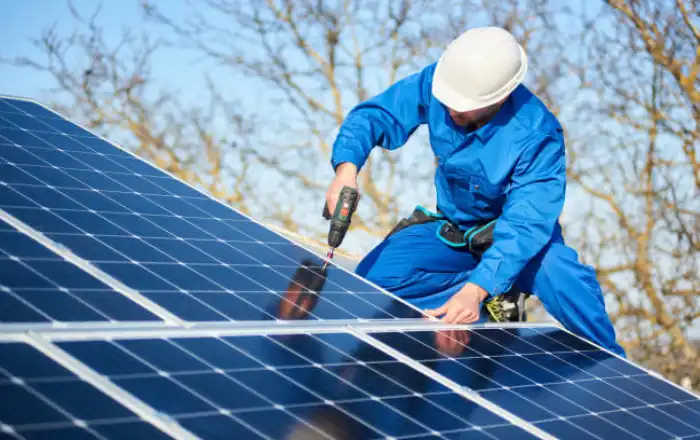Did you know that partnering with an EU-based supplier for photovoltaic solutions can greatly elevate your project’s success? By choosing a local supplier, you’re not just ensuring compliance with rigorous quality standards; you’re also tapping into a network that offers quicker delivery and enhanced communication. This strategic move can streamline your operations while aligning with innovative technologies that boost sustainability efforts. But what are the specific advantages that come with this collaboration, and how can they impact your bottom line?
Enhanced Quality Standards
When partnering with an EU-based supplier for photovoltaic solutions, you’ll quickly notice the enhanced quality standards that set these suppliers apart. EU regulations impose stringent requirements on solar panels, guaranteeing they meet high performance and durability criteria. This commitment to quality means that you can expect products that not only perform efficiently but also withstand the rigors of various environmental conditions.
EU-based suppliers often employ advanced manufacturing processes and cutting-edge solar technik to produce solar panels. This results in higher energy conversion rates and longer lifespans, which ultimately translate into better returns on your investment. Furthermore, these suppliers frequently conduct rigorous testing and quality assurance protocols, so you can trust that the solar panels you receive will meet or exceed industry benchmarks.
Additionally, many EU suppliers adhere to international certifications, such as ISO standards, further validating their commitment to quality. By choosing an EU-based supplier, you’re not just opting for solar panels with enhanced reliability; you’re also aligning with a supply chain that prioritizes sustainability and ethical practices. This holistic approach to quality guarantees that your photovoltaic solutions are not only effective but also responsible.
Shorter Supply Chains
Partnering with an EU-based supplier not only guarantees high-quality solar panels but also facilitates shorter supply chains, a significant advantage in today’s fast-paced market. Shorter supply chains mean quicker delivery times, allowing you to respond to market demands more efficiently. When you source photovoltaic solutions from within the EU, you’re minimizing the logistical complexities often associated with international shipping, such as customs delays and fluctuating tariffs.
By reducing the distance between production and distribution, you can more accurately forecast inventory needs and streamline your operations. This proximity also fosters better communication with your supplier, enabling faster problem resolution and a more agile response to changes in project specifications or market trends. Additionally, the reliability of local suppliers often translates to fewer disruptions, ensuring your photovoltaic projects remain on schedule.
Moreover, shorter supply chains can reduce the carbon footprint associated with transportation, aligning your business with sustainability goals. By choosing an EU-based partner, you not only enhance your operational efficiency but also contribute to a greener approach to energy solutions. Fundamentally, this strategic alignment offers significant operational and environmental benefits.
Compliance With Regulations
Maneuvering the complex landscape of energy regulations can be intimidating, but working with an EU-based supplier simplifies compliance considerably. In the sector of solar power, the EU has established stringent regulations aimed at promoting sustainability and reducing environmental impacts. When you partner with an EU-based supplier, you gain access to their expertise in navigating these regulations, ensuring that your photovoltaic solutions meet all necessary standards.
EU suppliers are typically well-versed in local and international compliance requirements, from quality certifications to environmental impact assessments. They stay updated on changes in legislation, which means you won’t have to invest time and resources in understanding the evolving regulatory landscape. This expertise not only reduces your risk of non-compliance but also enhances your project’s credibility.
Moreover, EU-based suppliers often prioritize sustainability in their operations, aligning with your commitment to responsible solar power solutions. By collaborating with them, you can confidently assert that your photovoltaic systems adhere to the highest regulatory standards, providing peace of mind to stakeholders and customers alike.
Access to Innovative Technologies
Accessing innovative technologies is a critical advantage of collaborating with an EU-based supplier for photovoltaic solutions. By partnering with these suppliers, you gain access to cutting-edge advancements in solar-energy technologies that can greatly enhance your project’s efficiency and effectiveness. EU suppliers often invest heavily in research and development, ensuring that you benefit from the latest breakthroughs in photovoltaic materials, solar panel designs, and energy storage systems.
Moreover, EU-based suppliers typically adhere to high standards in performance and sustainability, giving you confidence in the reliability of the technologies you’re utilizing. Their innovations, such as bifacial solar panels and smart inverters, can optimize energy capture and improve overall system performance. Additionally, these suppliers are often at the forefront of integrating digital solutions into solar-energy systems, enabling real-time monitoring and data analytics that can help you manage energy production more effectively.
Conclusion
Partnering with an EU-based supplier for photovoltaic solutions means you’re choosing enhanced quality, streamlined logistics, and regulatory compliance. You’re gaining access to innovative technologies that boost project efficiency and align with sustainability goals. By leveraging these advantages, you not only improve operational performance but also build brand trust in a competitive market. Ultimately, this partnership empowers you to achieve superior results, drive energy innovation, and contribute to a sustainable future.
